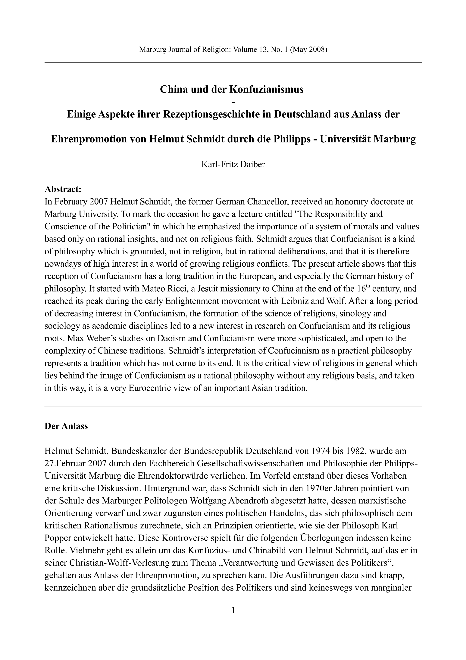China und der Konfuzianismus - Einige Aspekte ihrer Rezeptionsgeschichte in Deutschland aus Anlass der Ehrenpromotion von Helmut Schmidt durch die Philipps-Universität Marburg
In February 2007 Helmut Schmidt, the former German Chancellor, received an honorary doctorate at Marburg University. To mark the occasion he gave a lecture entitled "The Responsibility and Conscience of the Politician" in which he emphasized the importance of a system of morals and values...
Guardado en:
| Publicado en: | Marburg Journal of Religion |
|---|---|
| Autor principal: | |
| Formato: | Artikel (Zeitschrift) |
| Lenguaje: | alemán |
| Publicado: |
Philipps-Universität Marburg
2008
|
| Acceso en línea: | Acceso en línea |
| Etiquetas: |
Agregar Etiqueta
Sin Etiquetas, Sea el primero en etiquetar este registro!
|
| Sumario: | In February 2007 Helmut Schmidt, the former German Chancellor, received an honorary doctorate at Marburg University. To mark the occasion he gave a lecture entitled "The Responsibility and Conscience of the Politician" in which he emphasized the importance of a system of morals and values based only on rational insights, and not on religious faith. Schmidt argues that Confucianism is a kind of philosophy which is grounded, not in religion, but in rational deliberations, and that it is therefore nowadays of high interest in a world of growing religious conflicts. The present article shows that this reception of Confucianism has a long tradition in the European, and especially the German history of philosophy. It started with Mateo Ricci, a Jesuit missionary to China at the end of the 16 th century, and reached its peak during the early Enlightenment movement with Leibniz and Wolf. After a long period of decreasing interest in Confucianism, the formation of the science of religions, sinology and sociology as academic disciplines led to a new interest in research on Confucianism and its religious roots. Max Weber’s studies on Daoism and Confucianism were more sophisticated, and open to the complexity of Chinese traditions. Schmidt’s interpretation of Confucianism as a practical philosophy represents a tradition which has not come to its end. It is the critical view of religions in general which lies behind the image of Confucianism as a rational philosophy without any religious basis, and taken in this way, it is a very Eurocentric view of an important Asian tradition. |
|---|---|
| DOI: | 10.17192/mjr.2008.13.3531 |
 Publikationsserver
Publikationsserver